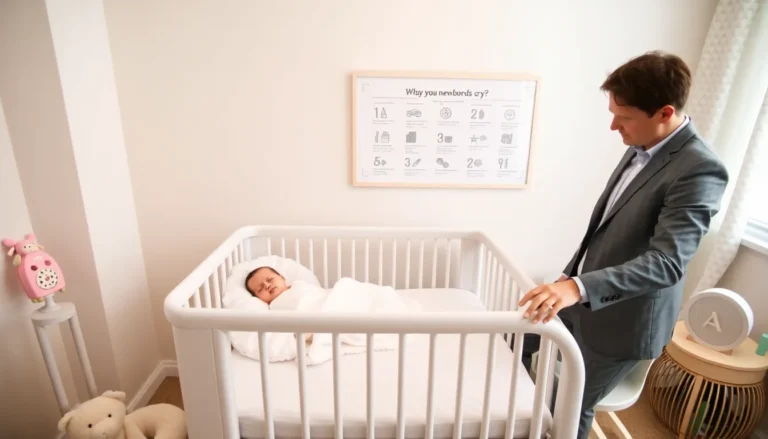Ever find yourself staring at your newborn, wondering if they’re auditioning for a role in the next great blockbuster? Those grunts and little noises can be endearing, yet utterly baffling. Picture this: you’re trying to get some sleep, and suddenly you hear a symphony of grunts, snorts, and squeaks. You might think, “Is this normal, or have they discovered a new language?” Be relieved: those sounds are quite common. Let’s jump into the reasons behind this adorable, albeit confusing, behavior.
Grunting is essentially a newborn’s way of communicating, and understanding it can make those sleepless nights a tad easier. Stick with us as we explore the intriguing realm of infant noises, and you’ll turn confusion into comfort in no time.
Table of Contents
ToggleUnderstanding Newborn Reflexes

Newborns are like tiny sponges, absorbing everything around them, but their communication skills are still in development. It’s important first to understand that many of the sounds they make, like grunting, stem from reflexes. These reflexes, such as the Moro reflex or rooting reflex, are involuntary responses to stimuli.
When a newborn grunts, it might simply be a reaction to the sensation of their body. They could be responding to a slight change in position or feeling something touch their skin. Remember, their nervous systems are like a new smartphone with the latest features, but the software is still updating. These mini reflexes can often lead to those adorable and sometimes concerning grunts.
Also, as babies grow, they begin developing muscle control, particularly around their mouth and throat, which can also generate grunting sounds. So, rest assured, your little one is just flexing those new muscles.
The Role of Grunting in Breathing
You might notice that grunting happens most frequently while your newborn is sleeping or transitioning between sleep stages. This can be linked to their overall breathing patterns. Infants have different breathing rhythms compared to adults. During sleep, they can move in and out of deep phases rapidly, and sometimes a grunt will accompany these transitions.
Grunting can also signify that your baby is trying to push air out in a bid to clear airways. Think of it as their little body’s way of adjusting to the outside world after spending nine months in a cozy cocoon. Ventilating those tiny lungs effectively can feel more challenging for them. Hence, grunting becomes a sort of vocal technique to aid in that process.
Also, newborns are still learning how to coordinate their breathing with feeding, which can lead to more grunting sounds. It’s all part of the process. But, in some cases, an unusual grunting sound may indicate breathing difficulties, which we will explore further shortly.
Common Causes of Grunting in Newborns
Now that we’re familiar with some of the mechanics behind grunting, let’s investigate into what could be causing these little sounds. Grunting can stem from several usual scenarios:
- Normal Digestion: Babies are often learning to process milk or formula. Sometimes, you might hear grunting as they work through gas or discomfort in their tiny tummies. This is generally a normal part of the digestive process.
- Sleep Transitions: As previously mentioned, grunting can accompany changes in sleep cycles. Newborns often grunt while transitioning through various sleep stages as they learn to navigate their sleep patterns.
- Normal Breathing Patterns: Grunting is often a normal part of a newborn’s early breathing routine. As they adjust to breathing outside the womb, it becomes quite common to hear these sounds during sleep or waking periods.
- Separation Anxiety: Newborns can experience mild separation anxiety, which might prompt them to grunt. They’re adjusting to individual existence, away from their snug surroundings.
While grunting can merely be a character trait of your little one, knowing when it’s more than just a quirky sound can ease any worry and lead to peace of mind.
When to Seek Medical Attention
As with any aspect of parenting, there are moments of concern that demand vigilance. While grunting is usually nothing to stress over, certain signs indicate it may be time to consult a pediatrician:
- Change in Color: If the grunting is accompanied by a change in skin color, particularly turning blue or gray, immediate medical help may be required.
- Difficulty Breathing: If your baby is struggling to breathe or showing signs of distress with wheezing or gasping, this is a red flag.
- Persistent Grunting: If your newborn grunts excessively for an extended period or shows signs of discomfort, it’s a good idea to have them checked out.
- Additional Symptoms: Watch for other troubling signs, such as high fever, vomiting, or difficulty feeding. If these accompany grunting, reach out to a healthcare provider.
Trust your instincts as a parent: if something doesn’t feel right, don’t hesitate to seek guidance. It’s better to be safe than to wonder.
Tips for Parents to Handle Grunting Newborns
Navigating parenthood is like trying to read a map that has no labels, incredibly confusing but incredibly rewarding. To help you cope with your little grunter, here are a few helpful tips:
- Stay Calm and Observe: Monitoring your baby while they grunt can provide insight. Look for accompanying features, such as color or breathing patterns.
- Keep a Routine: Establishing consistent sleep, feeding, and play schedules can aid in minimizing anxiety for both parent and baby.
- Practice Safe Sleep: Ensure your baby sleeps on their back in a safe, designated sleep area to reduce risks. A comfortable sleep environment may minimize unnecessary grunts.
- Consult Experts: Don’t hesitate to reach out to your pediatrician with questions. They can provide personalized advice and peace of mind.
By equipping yourself with knowledge and strategies, you can handle whatever adorable sounds your newborn might throw your way with confidence.


